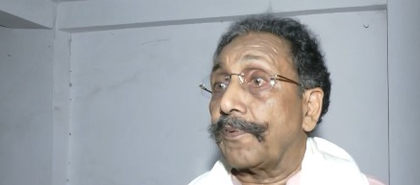50 years: Emergency was a black chapter in Indian democracy, recall victims
By IANS | Updated: June 25, 2025 13:23 IST2025-06-25T13:17:16+5:302025-06-25T13:23:48+5:30
New Delhi, June 25 As the BJP marks the 50th anniversary of the Emergency imposed by then Prime ...

50 years: Emergency was a black chapter in Indian democracy, recall victims
New Delhi, June 25 As the BJP marks the 50th anniversary of the Emergency imposed by then Prime Minister Indira Gandhi in 1975, several victims of the 20-month-long authoritarian period shared their painful memories with IANS — from unlawful arrests to forced sterilisations and systemic harassment.
Harish, a resident of Delhi, remembers the chilling night of June 25, 1975. “We were returning from Ramlila Maidan after listening to Jayaprakash Narayan’s speech. Around 2:30 A.M., nearly 20 police personnel were standing outside our home,” he said. “My father was picked up and taken to the police station. We thought he’d be released in a day or two, but he was locked up for a year. We weren’t even allowed to meet him.”
Harish recalled the chaos that gripped Delhi. “It was complete 'tandav'. Congress leaders like Ambika Soni, Lalit Makan along with Rukhsana Sultana were getting people sterilised. Even students weren’t spared. It was a dark, distressing era,” he added.
K.L. Malya, another victim, was working at a bank when Emergency was imposed. “I was suspended for organising a Satyagraha as part of the RSS. I was jailed in Bengaluru for a year,” he said.
“We ran underground newspapers to fight against censorship. Many families lost their livelihoods. My engagement had just taken place. Still, I got support from my family, who had long been associated with the Sangh.”
Pawan Bansal recounted the horrors of forced sterilisations. “People were picked up indiscriminately and sterilised. Young men, government employees — no one was spared. Those who refused had their promotions stalled or were sacked. It was worse than the British rule,” he said.
“Sanjay Gandhi rose to prominence, roaming the streets in an open jeep. Rukhsana Sultana and Ambika Soni accompanied him. Houses were demolished at will. What should never have happened, happened", he added.
Sudhir Madan was attending a 30-day RSS camp in Rohtak when Emergency was declared. “We had completed 27 days when we heard the news. We didn’t even understand what ‘Emergency’ meant back then. Soon, many of our workers were jailed and tortured for resisting,” he said.
On March 21, 1977, Prime Minister Indira Gandhi revoked the Emergency. The subsequent elections witnessed a massive political shift.
On Wednesday, the BJP is observing the day as 'Samvidhan Hatya Diwas’ across Delhi and other states, calling it a commemoration of democracy's darkest hour. Posters across the national Capital serve as stark reminders of the period many still recall with pain and fear.
Disclaimer: This post has been auto-published from an agency feed without any modifications to the text and has not been reviewed by an editor
Open in app